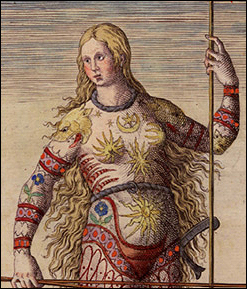2006 Undergraduate Humanities Forum Research Conference Keynote
Tattooing is one of the oldest and most widespread forms of irreversible body art. The practice has been found at some point in nearly every major culture throughout history. Its storied development in Western culture mixes text and images in complex ways that are not as common in other forms of bodily inscription, such as cosmetics, painting, and scarification.
Join Oxford historian Jane Caplan as she explains what tattooed European bodies of the late 19th century reveal about western body ornamentation today.
Historian Jane Caplan joined the faculty of Oxford University in 2004 following over two decades at Bryn Mawr College. Before that she helped establish one of Britain's first university courses in women's studies and was instrumental in the development of feminist scholarship at Bryn Mawr.
Her primary research interests are the history of Nazi Germany and the documentation of individual identity in 19th-century Europe, especially the written and visual marks of identity on and off the body. As the editor of Written on the Body: The Tattoo in European and American History (Princeton 2000), Caplan received widespread attention from the press and became a frequent contributor to popular broadcasts and publications on the topic of tattoo.
Her selected other works include "'One of the Strangest Relics of a Former State': Tattoos and the Discourses of Criminality in Europe 1880-1920," in Criminals and their Scientists: The History of Criminology in International Perspective, P Becker, RF Wetzell, eds. (Cambridge Univ Press, 2006); The Women's Camp in Moringen: A Memoir of Imprisonment in Germany 1936-1937, ed. (Berghahn Books, 2006); Government Without Administration: State and Civil Service in Weimar and Nazi Germany (Clarendon 1989); Reevaluating the Third Reich, with T Childers, eds. (Holmes & Meier, 1993); Nazism, Fascism and the Working Class, with TW Mason, eds. (Cambridge 1995); and Documenting Individual Identity: The Development of State Practices in the Modern World, with J Torpey, eds. (Princeton 2001). She is currently researching the early history of Nazi concentration camps.



